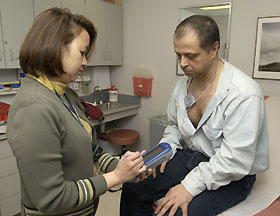For more archives, go to the Advance Archive/Search Page.
Health Center Offers New Treatment
To Alleviate Parkinson's Symptoms
Controlling the symptoms of Parkinson's disease is the focus of a relatively new procedure that is now being offered at the Health Center. Deep brain stimulation has been shown to significantly control tremors, sluggish movement, rigidity, and impaired coordination , the most frustrating symptoms of Parkinson's disease, according to neurologist Dr. Joy Antonelle de Marcaida. And the Health Center is the only site in Connecticut offering the procedure.
 |
Dr. Joy Antonelle de Marcaida, an assistant professor of neurology, works with a device to control symptoms
of Parkinson's disease for William Stanziano, a patient at the Health Center. Photo by Peter Morenus
|
The surgical procedure involves channeling electrodes implanted in the brain to a pair of devices called pulse generators that are placed in the upper right and left sides of the chest, says Health Center neurosurgeon Dr. Ahmed Khan, who performs the surgery. Each implant is programmed to send high frequency electrical charges to a specific part of the brain.
Using a programming device placed on the chest over the pulse generator, de Marcaida monitors and can change the settings to provide maximum relief for the patient.
"Sometimes the programming will work right away. When the symptoms are very obvious, for example tremors, we can see improvement immediately," de Marcaida says. "However for the symptoms of slow movement and stiffness, some fine tuning may be required to achieve the best results."
Parkinson's disease is a chronic, progressive neurodegenerative condition that affects about one in every 100 people aged 65 and over. Surgical treatments for the disease have increased during the past decade because of the limitations of current drug therapies and improvements and advances in procedures such as deep brain stimulation.
"This procedure can help Parkinson's patients with moderate to advanced Parkinson's disease return to a better quality of life," de Marcaida says. "At these stages of the disease, medications usually provide only a few hours of relief from symptoms after each dose. This limits what patients can do during the course of the day, because the fluctuations can leave them immobile for up to an hour."
Although deep brain stimulation treats the symptoms of Parkinson's, it does not prevent the disease from worsening, slow its progression, or prevent later problems, such as dementia.
"We don't know what causes Parkinson's, but we know that it results in cells deteriorating and is irreversible," says de Marcaida. "We can only treat the symptoms, since we have not found the cure."

